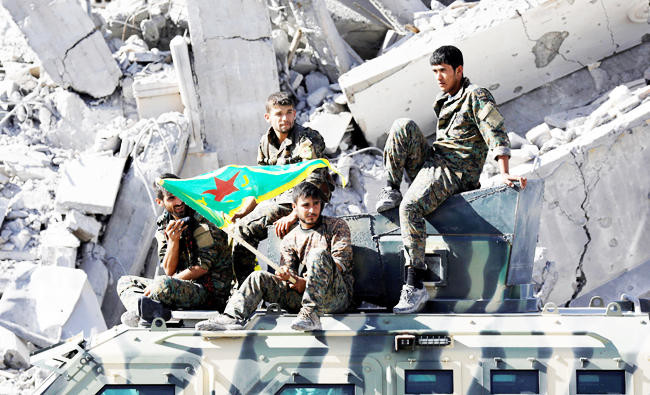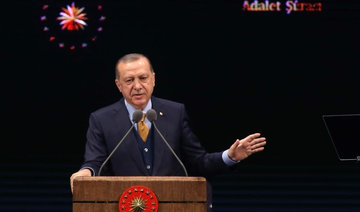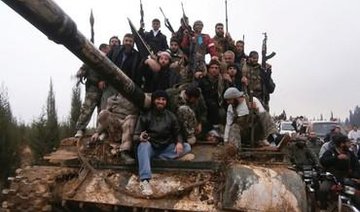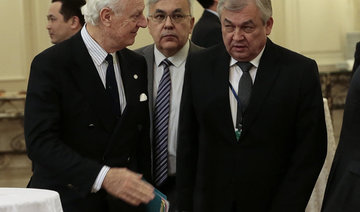ANKARA: Turkey reacted with undisguised anger on Sunday to plans by the US-led coalition against Daesh to establish a 30,000-strong Kurdish-led border security force in northern Syria.
At least half of the new force will be retrained fighters from the Syrian Democratic Forces (SDF), which are dominated by the Kurdish People’s Protection Units (YPG). They are the coalition’s main allies in Syria — but Turkey considers the YPG to be the Syrian branch of the outlawed PKK, and therefore a terrorist group.
“Rather than end its support to the PYD-YPG, these steps taken to legitimize a terror organization and to make it permanent in the region are worrying,” said Ibrahim Kalin, spokesman for Turkish President Recep Tayyip Erdogan.
“Accepting this state of affairs is absolutely not possible. We reserve all our rights of intervention against terror.”
With the offensive against Daesh winding down, the coalition and its allies are shifting their focus to border security, coalition spokesman Col. Ryan Dillon said.
“There is a goal of a final force of about 30,000. There are approximately 230 individuals training right now in the border security force. That’s an inaugural class.”
The new force will secure checkpoints and guard against improvised explosive devices. Kurdish members are expected to serve on Syria’s northern border with Turkey, with Arab forces deployed along the border with Iraq and the Euphrates River valley.
The new move was further evidence that US and Turkish policies and objectives in Syria were continuing to diverge, Serhat Guvenc, a professor of international relations at Istanbul Kadir Has University, told Arab News.
“It was crystal clear that the US would not change its decision to collaborate with the SDF in the short and medium term,” he said.
“When the future of the Syrian conflict is being discussed at the negotiating table, the military gains on the ground will swing the balance.”
The US aim was to consolidate the SDF’s gains and increase its bargaining power before the Russian-sponsored Sochi peace congress at the end of this month, he said.
Mete Sohtaoglu, a Middle East researcher in Istanbul, said the coalition had taken action before to transform the YPG into a regular army.
“They have already restructured this armed force in various regions of Syria,” he told Arab News.
“In the framework of peace plans for Syria, all armed groups, including the YPG, were set to be incorporated into one single army.”
The border force was part of a broader initiative by the US to establish a “parallel state” within Syria, Sohtaoglu said, and he expected a Turkish military response in Afrin, Manbij, Tel Abyad and Kobani.
“If this US support is reflected politically and diplomatically, Turkey will begin a comprehensive and wide-ranging military operation in the north of Syria by taking the most important decision in its history,” he said.
Because of the latest US move, Russia was likely to support, or at least turn a blind eye to, Turkish military intervention in Afrin, said Giray Sadik, an international security expert and associate professor at Ankara Yildirim Beyazit University.
“It may also further boost the cooperation within the Russia-Iran-Turkey axis against the US presence in Syria,” he said.
Turkish anger over new Kurdish-led border security force in Syria
Turkish anger over new Kurdish-led border security force in Syria

Israel strikes Yemen’s Sana’a airport, ports and power stations

- Houthis said that multiple air raids targeted an airport, military air base and a power station in Yemen
JERUSALEM: Israel’s military said it struck multiple targets linked to the Iran-aligned Houthi movement in Yemen on Thursday, including Sana’a International Airport and three ports along the western coast.
Attacks hit Yemen’s Hezyaz and Ras Kanatib power stations as well as military infrastructure in the ports of Hodeidah, Salif and Ras Kanatib, Israel’s military added.
The Houthis have repeatedly fired drones and missiles toward Israel in what they describe as acts of solidarity with Palestinians in Gaza.
The Israeli attacks on the airport, Hodeidah and on one power station, were reported by Al Masirah TV, the main television news outlet run by the Houthis.
More than a year of Houthi attacks have disrupted international shipping routes, forcing firms to re-route to longer and more expensive journeys that have in turn stoked fears over global inflation.
Israel has instructed its diplomatic missions in Europe to try to get the Houthis designated as a terrorist organization.
The UN Security Council is due to meet on Monday over Houthi attacks against Israel, Israel’s UN Ambassador Danny Danon said on Wednesday.
On Saturday, Israel’s military failed to intercept a missile from Yemen that fell in the Tel Aviv-Jaffa area, injuring 14 people.
Syria authorities say torched 1 million captagon pills

DAMASCUS: Syria’s new authorities torched a large stockpile of drugs on Wednesday, two security officials told AFP, including one million pills of captagon, whose industrial-scale production flourished under ousted president Bashar Assad.
Captagon is a banned amphetamine-like stimulant that became Syria’s largest export during the country’s more than 13-year civil war, effectively turning it into a narco state under Assad.
“We found a large quantity of captagon, around one million pills,” said a balaclava-wearing member of the security forces, who asked to be identified only by his first name, Osama, and whose khaki uniform bore a “public security” patch.
An AFP journalist saw forces pour fuel over and set fire to a cache of cannabis, the painkiller tramadol, and around 50 bags of pink and yellow captagon pills in a security compound formerly belonging to Assad’s forces in the capital’s Kafr Sousa district.
Captagon has flooded the black market across the region in recent years, with oil-rich Saudi Arabia a major destination.
“The security forces of the new government discovered a drug warehouse as they were inspecting the security quarter,” said another member of the security forces, who identified himself as Hamza.
Authorities destroyed the stocks of alcohol, cannabis, captagon and hashish in order to “protect Syrian society” and “cut off smuggling routes used by Assad family businesses,” he added.
Syria’s new Islamist rulers have yet to spell out their policy on alcohol, which has long been widely available in the country.
Since an Islamist-led rebel alliance toppled Assad on December 8 after a lightning offensive, Syria’s new authorities have said massive quantities of captagon have been found in former government sites around the country, including security branches.
AFP journalists in Syria have seen fighters from Islamist group Hayat Tahrir Al-Sham (HTS) set fire to what they said were stashes of captagon found at facilities once operated by Assad’s forces.
Security force member Hamza confirmed Wednesday that “this is not the first initiative of its kind — the security services, in a number of locations, have found other warehouses... and drug manufacturing sites and destroyed them in the appropriate manner.”
Maher Assad, a military commander and the brother of Bashar Assad, is widely accused of being the power behind the lucrative captagon trade.
Experts believe Syria’s former leader used the threat of drug-fueled unrest to put pressure on Arab governments.
A Saudi delegation met Syria’s new leader Ahmed Al-Sharaa in Damascus on Sunday, a source close to the government told AFP, to discuss the “Syria situation and captagon.”
Jordan in recent years has also cracked down on the smuggling of weapons and drugs including captagon along its 375-kilometer (230-mile) border with Syria.
Jordan says 18,000 Syrians returned home since Assad’s fall

AMMAN: About 18,000 Syrians have crossed into their country from Jordan since the government of Bashar Assad was toppled earlier this month, Jordanian authorities said on Thursday.
Interior Minister Mazen Al-Faraya told state TV channel Al-Mamlaka that “around 18,000 Syrians have returned to their country between the fall of the regime of Bashar Assad on December 8, 2024 until Thursday.”
He said the returnees included 2,300 refugees registered with the United Nations.
Amman says it has hosted about 1.3 million Syrians who fled their country since civil war broke out in 2011, with 650,000 formally registered with the United Nations.
Lebanon hopes for neighborly relations in first message to new Syria government

- Lebanon’s Iran-backed Hezbollah played a major part propping up Syria’s ousted President Bashar Assad through years of war
- Syria’s new Islamist de-facto leader Ahmed Al-Sharaa is seeking to establish relations with Arab and Western leaders
DUBAI: Lebanon said on Thursday it was looking forward to having the best neighborly relations with Syria, in its first official message to the new administration in Damascus.
Lebanese Foreign Minister Abdallah Bou Habib passed the message to his Syrian counterpart, Asaad Hassan Al-Shibani, in a phone call, the Lebanese Foreign Ministry said on X.
Lebanon’s Iran-backed Hezbollah played a major part propping up Syria’s ousted President Bashar Assad through years of war, before bringing its fighters back to Lebanon over the last year to fight in a bruising war with Israel – a redeployment which weakened Syrian government lines.
Under Assad, Hezbollah used Syria to bring in weapons and other military equipment from Iran, through Iraq and Syria and into Lebanon. But on Dec. 6, anti-Assad fighters seized the border with Iraq and cut off that route, and two days later, Islamist militants captured the capital Damascus.
Syria’s new Islamist de-facto leader Ahmed Al-Sharaa is seeking to establish relations with Arab and Western leaders after toppling Assad.
Iraqi intelligence chief discusses border security with new Syrian administration

BAGHDAD: An Iraqi delegation met with Syria’s new rulers in Damascus on Thursday, an Iraqi government spokesman said, the latest diplomatic outreach more than two weeks after the fall of Bashar Assad’s rule.
The delegation, led by Iraqi intelligence chief Hamid Al-Shatri, “met with the new Syrian administration,” government spokesman Bassem Al-Awadi told state media, adding that the parties discussed “the developments in the Syrian arena, and security and stability needs on the two countries’ shared border.”
















